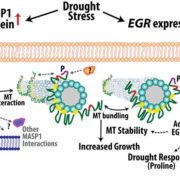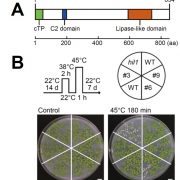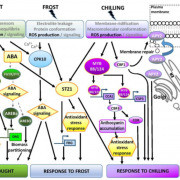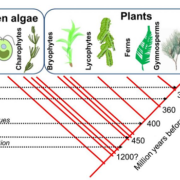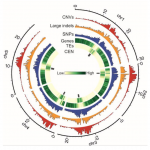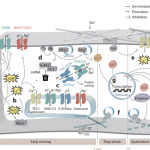Meltome atlas: revealing protein thermal stability across the tree of life (Nature Methods)
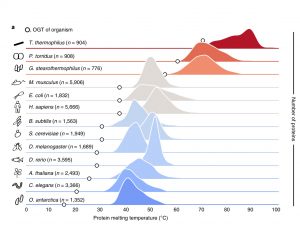 Environmental cues can affect the structure and function of proteins. To get broad empirical information about the effect of temperature on protein stability, Jarzab, Kurzawa, Hopf et al. generated an atlas of proteome thermal stability across 13 model organisms, including bacteria, yeast, worm, fish, fly, plant, mouse and human. After heating cells or lysates, the soluble protein fraction was digested and labeled, followed by peptide identification and quantification using LC-MS/MS, revealing melting features for ~48,000 proteins. With these high-quality thermal proteome profiles, the authors found that in eukaryotes there is an important gap between the optimal growth temperature and the temperature their proteins begin to precipitate (melting temperature). Additionally, they analyzed how factors such as amino acid sequence and composition, protein size and abundance, and protein complex formation affect protein thermal stability. This atlas reports melting points for almost 3000 proteins from Arabidopsis seedlings, with melting temperatures ranging from 30.22 to 68.43 ºC. The curves can be easily visualized and compared in this site: http://meltomeatlas.proteomics.wzw.tum.de:5003. (Summary by Humberto Herrera-Ubaldo @herrera_h Nature Methods 10.1038/s41592-020-0801-4
Environmental cues can affect the structure and function of proteins. To get broad empirical information about the effect of temperature on protein stability, Jarzab, Kurzawa, Hopf et al. generated an atlas of proteome thermal stability across 13 model organisms, including bacteria, yeast, worm, fish, fly, plant, mouse and human. After heating cells or lysates, the soluble protein fraction was digested and labeled, followed by peptide identification and quantification using LC-MS/MS, revealing melting features for ~48,000 proteins. With these high-quality thermal proteome profiles, the authors found that in eukaryotes there is an important gap between the optimal growth temperature and the temperature their proteins begin to precipitate (melting temperature). Additionally, they analyzed how factors such as amino acid sequence and composition, protein size and abundance, and protein complex formation affect protein thermal stability. This atlas reports melting points for almost 3000 proteins from Arabidopsis seedlings, with melting temperatures ranging from 30.22 to 68.43 ºC. The curves can be easily visualized and compared in this site: http://meltomeatlas.proteomics.wzw.tum.de:5003. (Summary by Humberto Herrera-Ubaldo @herrera_h Nature Methods 10.1038/s41592-020-0801-4


